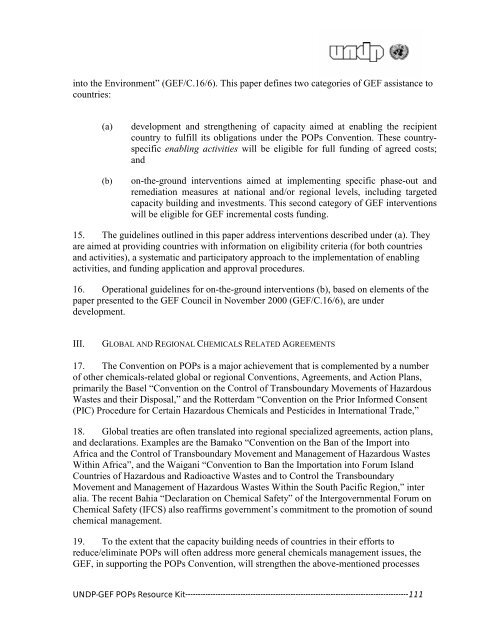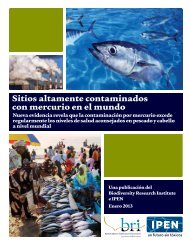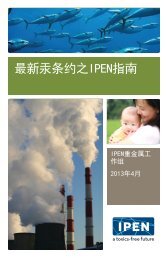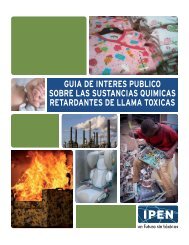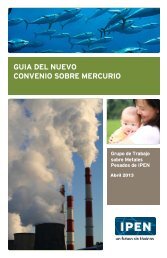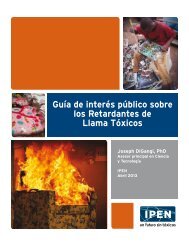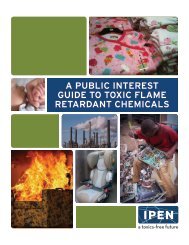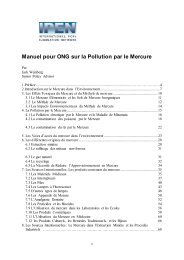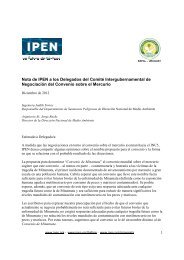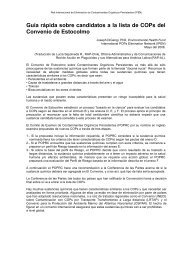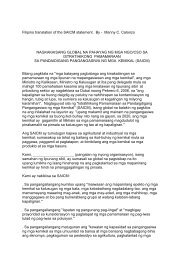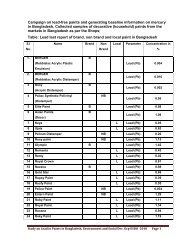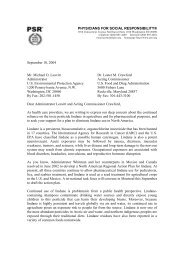The UNDP-GEF POPs Resource Kit - International POPs Elimination ...
The UNDP-GEF POPs Resource Kit - International POPs Elimination ...
The UNDP-GEF POPs Resource Kit - International POPs Elimination ...
Create successful ePaper yourself
Turn your PDF publications into a flip-book with our unique Google optimized e-Paper software.
into the Environment” (<strong>GEF</strong>/C.16/6). This paper defines two categories of <strong>GEF</strong> assistance to<br />
countries:<br />
(a) development and strengthening of capacity aimed at enabling the recipient<br />
country to fulfill its obligations under the <strong>POPs</strong> Convention. <strong>The</strong>se countryspecific<br />
enabling activities will be eligible for full funding of agreed costs;<br />
and<br />
(b) on-the-ground interventions aimed at implementing specific phase-out and<br />
remediation measures at national and/or regional levels, including targeted<br />
capacity building and investments. This second category of <strong>GEF</strong> interventions<br />
will be eligible for <strong>GEF</strong> incremental costs funding.<br />
15. <strong>The</strong> guidelines outlined in this paper address interventions described under (a). <strong>The</strong>y<br />
are aimed at providing countries with information on eligibility criteria (for both countries<br />
and activities), a systematic and participatory approach to the implementation of enabling<br />
activities, and funding application and approval procedures.<br />
16. Operational guidelines for on-the-ground interventions (b), based on elements of the<br />
paper presented to the <strong>GEF</strong> Council in November 2000 (<strong>GEF</strong>/C.16/6), are under<br />
development.<br />
III. GLOBAL AND REGIONAL CHEMICALS RELATED AGREEMENTS<br />
17. <strong>The</strong> Convention on <strong>POPs</strong> is a major achievement that is complemented by a number<br />
of other chemicals-related global or regional Conventions, Agreements, and Action Plans,<br />
primarily the Basel “Convention on the Control of Transboundary Movements of Hazardous<br />
Wastes and their Disposal,” and the Rotterdam “Convention on the Prior Informed Consent<br />
(PIC) Procedure for Certain Hazardous Chemicals and Pesticides in <strong>International</strong> Trade,”<br />
18. Global treaties are often translated into regional specialized agreements, action plans,<br />
and declarations. Examples are the Bamako “Convention on the Ban of the Import into<br />
Africa and the Control of Transboundary Movement and Management of Hazardous Wastes<br />
Within Africa”, and the Waigani “Convention to Ban the Importation into Forum Island<br />
Countries of Hazardous and Radioactive Wastes and to Control the Transboundary<br />
Movement and Management of Hazardous Wastes Within the South Pacific Region,” inter<br />
alia. <strong>The</strong> recent Bahia “Declaration on Chemical Safety” of the Intergovernmental Forum on<br />
Chemical Safety (IFCS) also reaffirms government’s commitment to the promotion of sound<br />
chemical management.<br />
19. To the extent that the capacity building needs of countries in their efforts to<br />
reduce/eliminate <strong>POPs</strong> will often address more general chemicals management issues, the<br />
<strong>GEF</strong>, in supporting the <strong>POPs</strong> Convention, will strengthen the above-mentioned processes<br />
<strong>UNDP</strong>-<strong>GEF</strong> <strong>POPs</strong> <strong>Resource</strong> <strong>Kit</strong>-----------------------------------------------------------------------------------------111


